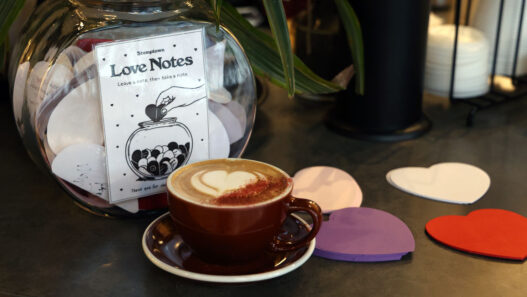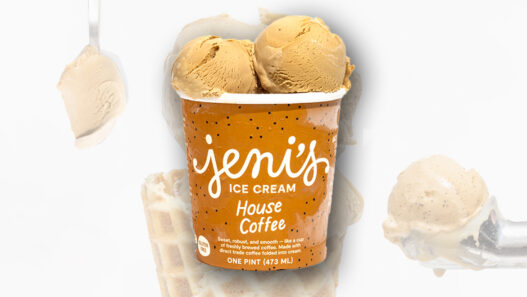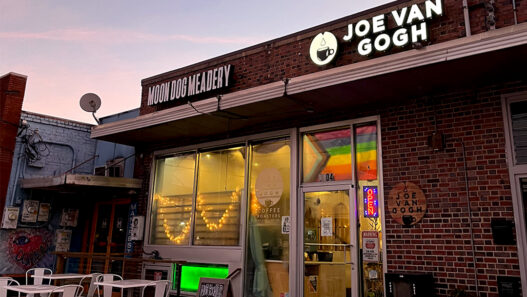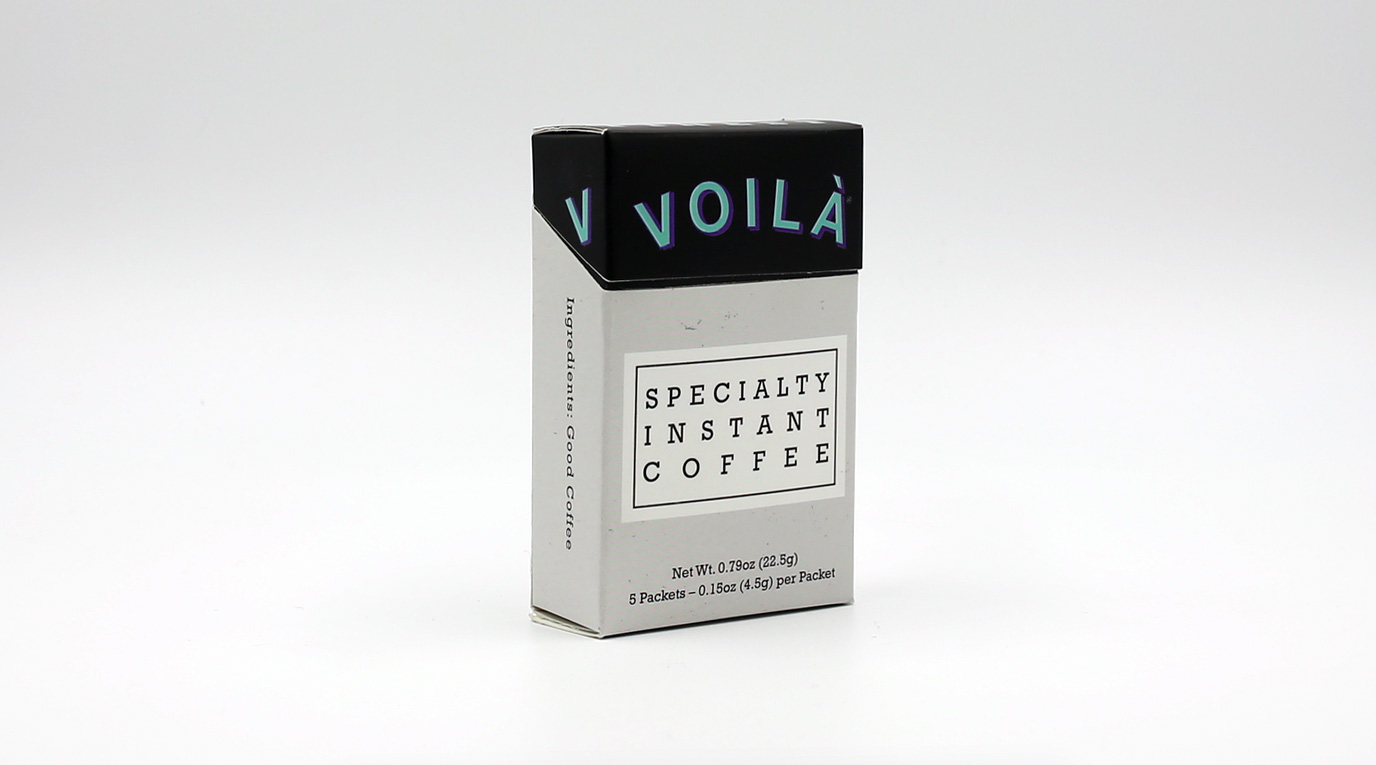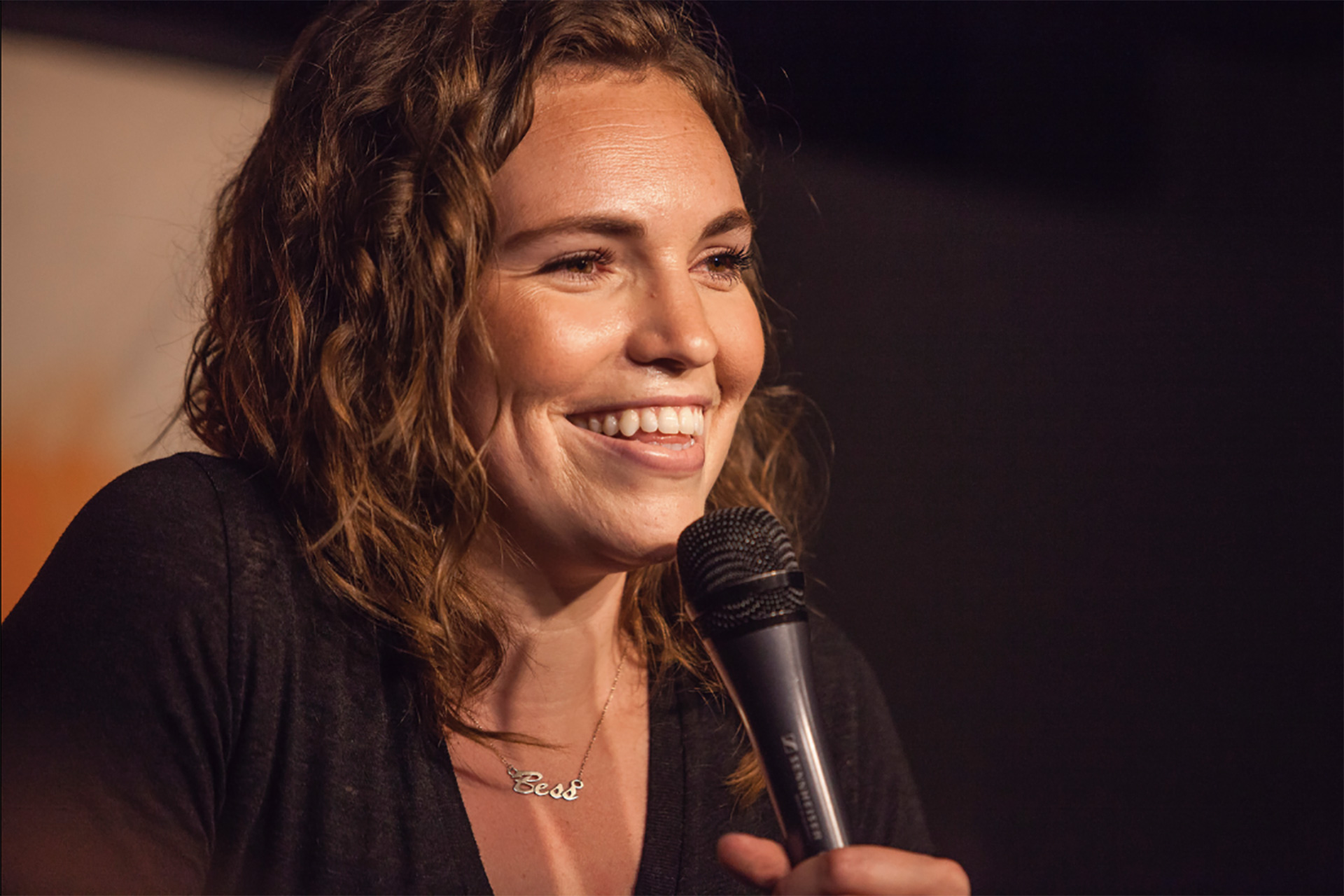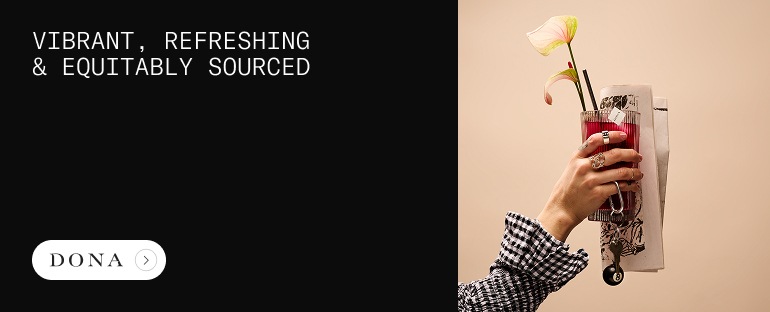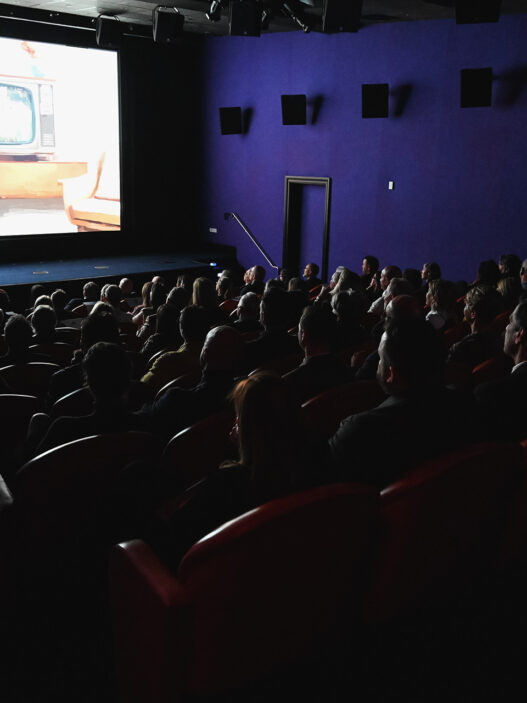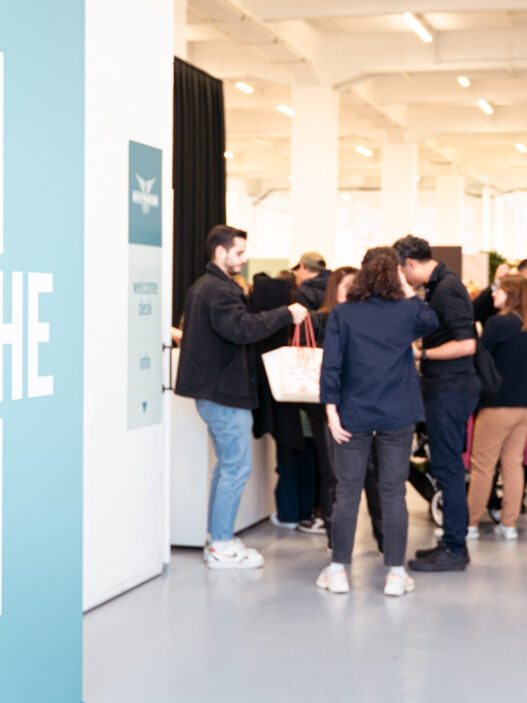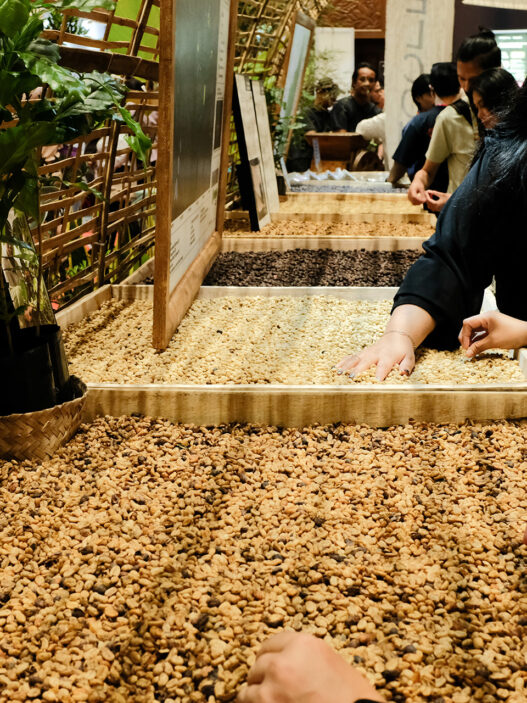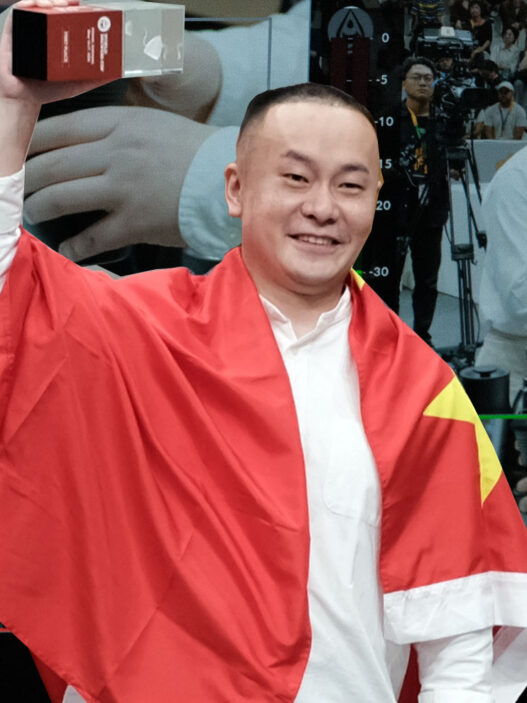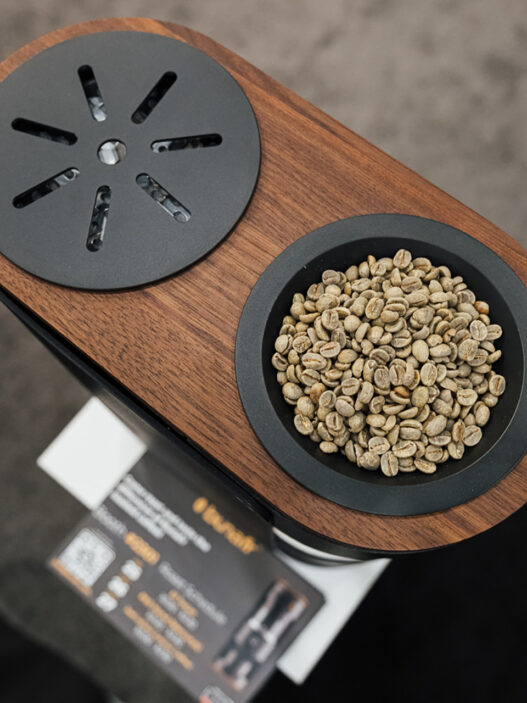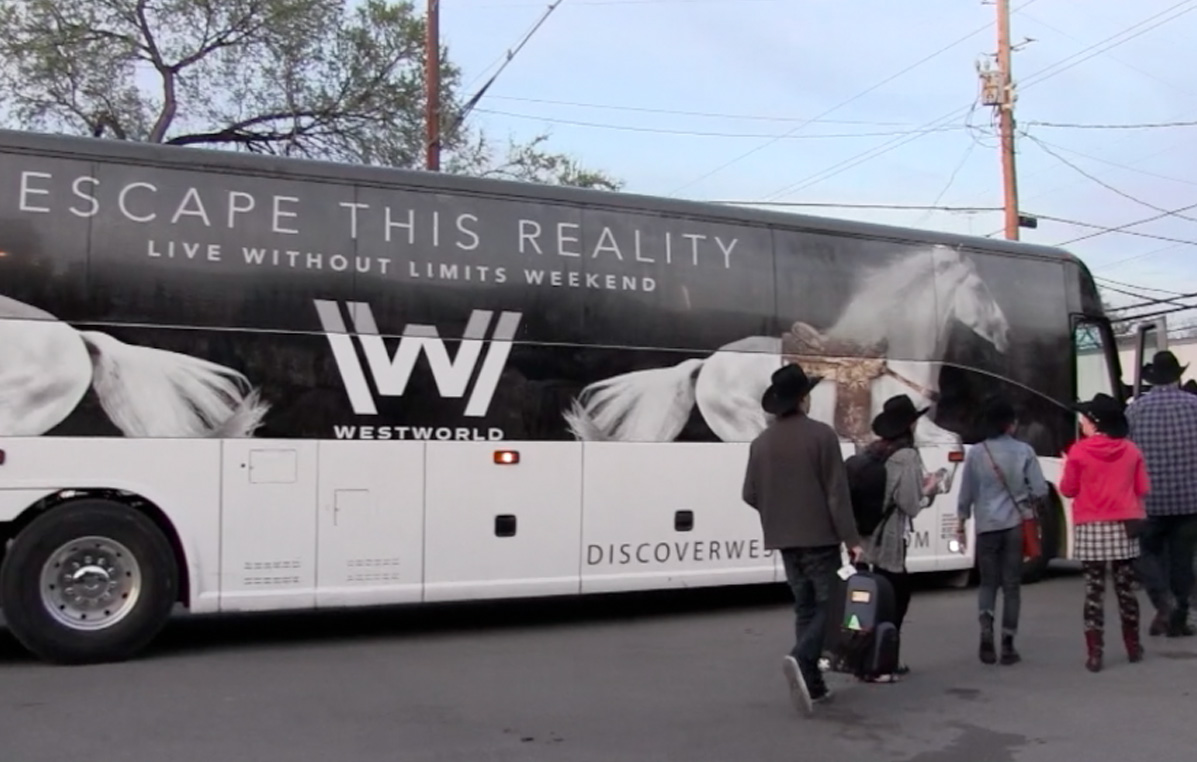
The thing you notice is the enormous bus, wrapped in a custom Westworld theme—the show’s techno-futurist “W” logo flanked by two identical horses, costumed in ceremonial garb. The bus is running, emitting a rumbling audible hummmm, hungry for new passengers. The next thing you notice is the white: staff, handlers, bouncers, ID checkers, check-in professionals, they’re all dressed head to toe in the spotless DELOS uniform of white-on-white. The head bouncer is perhaps six and a half feet tall, in a white tuxedo with white patent leather shoes. The tagline “LIVE WITHOUT LIMITS” is etched onto the side of the building.
I’m here in Austin, Texas to document the first-ever coffee exhibition at SXSW 2018, and to host a conversation live on stage with the Yemeni coffee importer Mokhtar Alkhanshali, who recently had his life story turned into a book by the author Dave Eggers. But that will all come later. Tonight I’m attending a press preview for what is perhaps this year’s hottest activation at the festival: a fully immersive and astonishingly ambitious recreation of Westworld, set 20 miles outside of town. They perhaps did not Google me before granting me a media pass to this event, because nothing—and I mean nothing—about Westworld: Live Without Limits has even the tiniest iota of relevance to coffee. Or maybe they don’t care what I write about, so long as I’m there writing. There are actors playing roles tonight at Westworld. They’re not the only ones.
***
I’m checked, searched, photographed, and asked to sign a waiver promising I won’t curse, steal, touch, or in any way disrupt the proceeds at Westworld. There, past the check-in station and photo backdrop, is the first of what I’m sure will be several player pianos at today’s Westworld experience. A crowd ebbs and flows around it, phones out, some with full camera and video rigs, documenting the self-playing piano as it wends its way through the Rolling Stones’ “Paint It Black.” A man in a full-body floral print suit, like some erstwhile flower-themed Batman villain (“The Florist,” perhaps, or “Horty Kultrist”) stops to film himself alongside the piano to what I can only guess is an audience of thousands on YouTube, or more likely, Twitch.
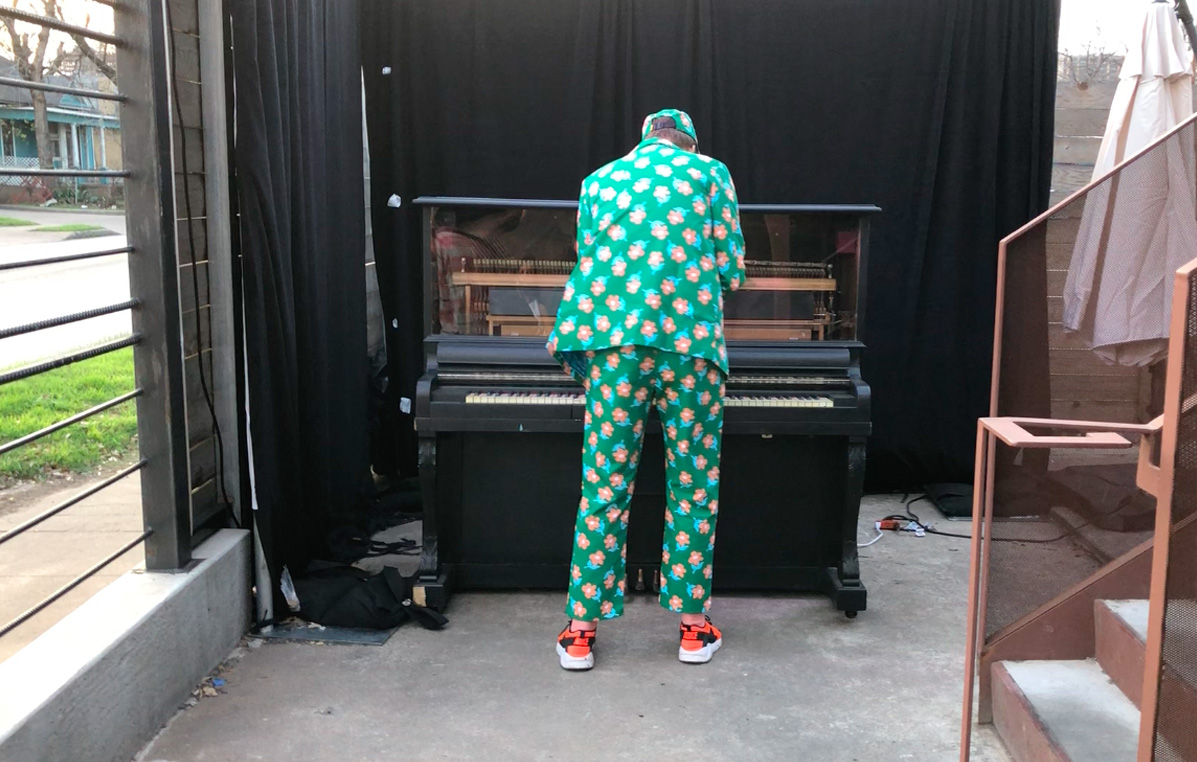
We head upstairs to the MESA GOLD, our luxury waiting area. It is a seamlessly opulent DELOS branded transformation of an Austin rooftop event space. There are French 75 cocktails served tall and cool. There are passed cheese skewers and fried bacon potato skins. There’s more staff dressed perfectly in white. There is no coffee on offer here at the Delos’ MESA GOLD, but I’m directed by a helpful robot to a gleaming white back counter, where I am to pick up my complimentary Westworld branded cowboy hat.
At that back counter an important choice is made: white hat or black hat. It’s not up to the guest, but rather, up to the distributor robots manning this booth. The robot looks at me for all of two seconds and declares that I am a black hat. It seems like a big decision for such a quick judgement but perhaps that’s part of the program code. I’m disappointed, actually; I was hoping for a white hat. Not because I want the do-goodly narrative, I tell myself, but because the brown trim on the hat would match my sport coat.
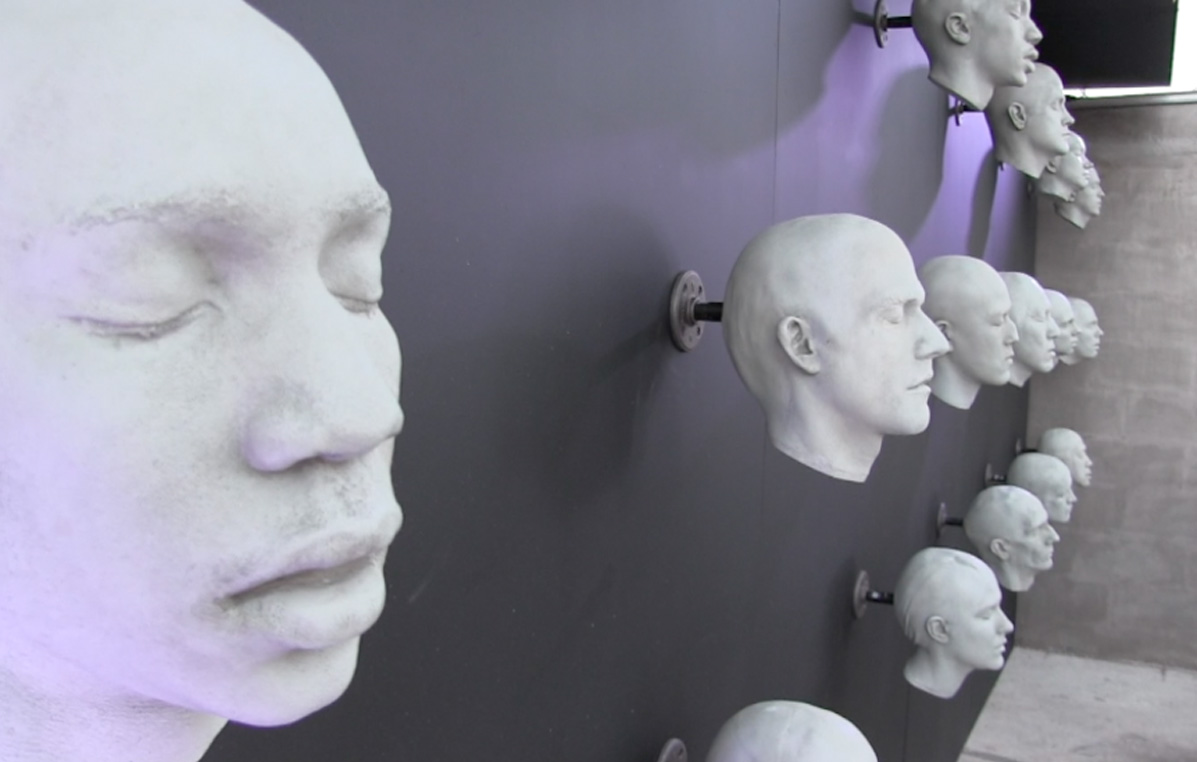
We stand around a tall table with our tall drinks. This lounge is full of journalists, dressed in journalist casual, eyes glued to phones, each one wearing a cowboy hat. There are no limits at Westworld but there is a strict one drink per person limit at the MESA GOLD, where we wait for the bus, and are treated to passed apps and a clubby come down dance mix. A disembodied voice declares over the mix that we’ve got 15 minutes until the next bus leaves. This is the first time I’ve worn a cowboy hat in public. I take my cowboy hat off.
Something inside compels me back over to the hat station. I tell the robot I’d rather have a white hat instead.
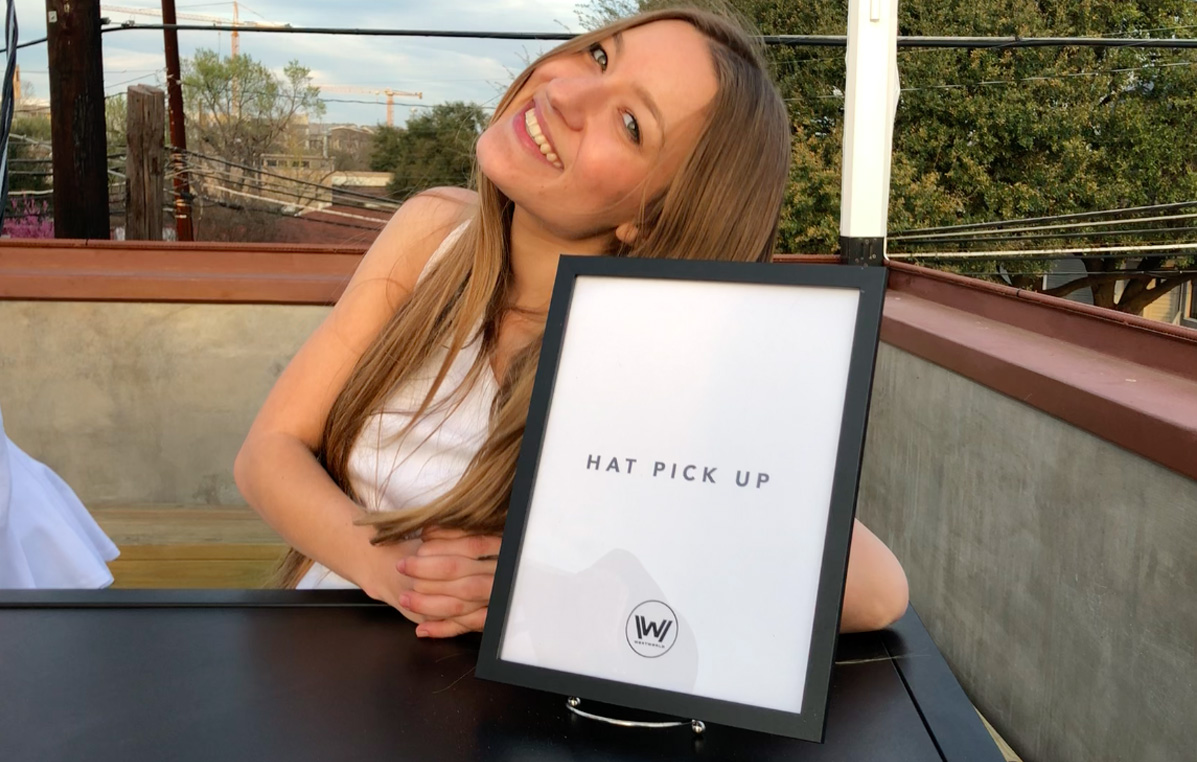
“That’s a very black hat thing to ask for,” she tells me.
“I know, but I really think my heart is set.”
“Well, if your heart is set…”
I feel better immediately as a white hat—like I can see myself tipping the brim in acknowledgment of a courtesy. You can tell the Texans here by who looks comfortable immediately in a cowboy hat. The staff from the Daily Dot, for example, look absolutely at home in their black hats and denim. A few more nacho cups are passed as we wait for the load-in to begin. About the most lawless thing I see happening is the open public consumption of cigarettes. At last the klaxon rings and we’re herded, faces in phones, hats on heads, towards our waiting passage.
As we’re walking towards the bus I brush past two men conducting some sort of interview together on the stairs. They have Italian, or maybe Eastern European accents.
“What are you here escaping from?
“Zee monotony uff life.”
We load on the bus, which from the inside we learn is really a semi-luxury coach—there are individual power plugs for each seat, but there are not individual lights or air conditioning units for each seat. The bus groans from a low rumble to an engine-puffing roar, and as we begin to pull out from MESA GOLD a robot—dressed entirely in white—stands up to deliver some brief remarks.
“Hello, my name is Emmanuel, and welcome to Westworld. Here you are welcome to Live Without Limits.”
The bus applauds.
“I am available to make sure you get the most out of your experience. There are only two rules here: Don’t break anything in the park, and do not touch any of the hosts.”
There is an audible murmur from the bus. That’s quite a bit different from the show, Emmanuel! A uniformed Austin police officer stops traffic on Cesar Chavez as we pull the bus out onto the street.
“Does anyone have any questions?”
“Is there any coffee at Westworld?”
“No.”
***
The sun sets over Austin as we pull onto the freeway. There’s no WiFi on the bus, so I turn my phone on airplane mode and eavesdrop on the cacophony of conversations happening around me. There is a palpable energy, but I wouldn’t call it escapist, or at least not any more escapist than the rest of SXSW. Mostly I overhear assorted media gossip. Somebody’s new intern can’t string two sentences together without misusing a comma, apparently. Someone else’s colleague’s copy is a goddamned mess. You come to the frontier to discover who you were truly meant to be, or so says the Westworld marketing jargon. I think these journalists already know.
The countryside turns dark, then pitch black. We turn from the interstate to a highway to a little country road, and then a dirt path. Another Westworld wrapped bus passes us on its way out of the park. The show’s theme music starts to pump on the bus AV system. And at last we’re here.
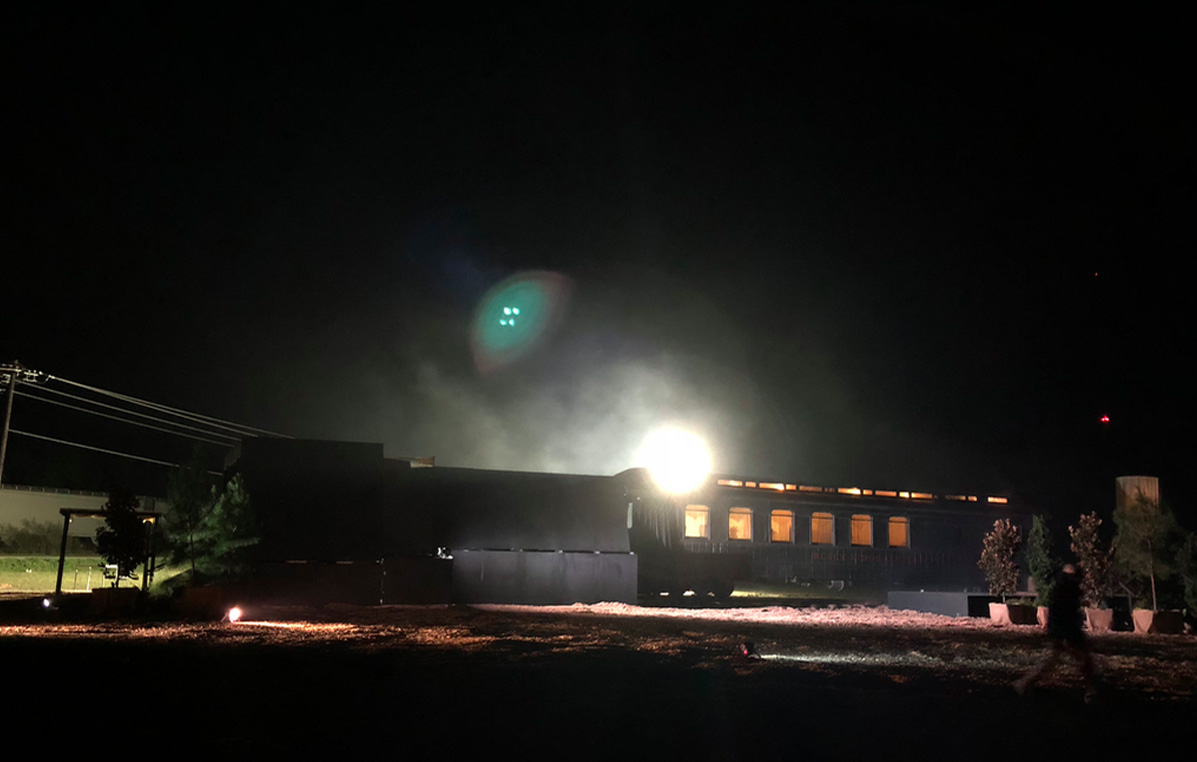
Violence—so very much essential to the essence of HBO’s Westworld—is teased to us immediately upon entering Westworld: Live Without Limits. We walk up a set of metal stairs, past a velvet curtain, and into eerily clean, all-white DELOS-branded waiting area, at the center of which sits a gleaming glass gun case. It has pistols and gun belts, stubby shotguns and huge antique knives. We can look but we can’t touch. We’ll enter the park unarmed, past the gun case and into a waiting train car. The lights change; the music dims; there is a little bit of a Disney’s Haunted Mansion thing, or maybe the basement of the Tower of Terror. Actors playing robots (which on TV are played by real actors). My skin starts to crawl. We’re not quite in the uncanny valley—more like a hillside saloon with a fine view of it.
“Welcome to Sweetwater! Mind your business and you may just make it out alive.”
And then, I step out of the train car and am faced by the enormity of this park. It is impressively vast—you can’t see the edge of it. The ground is dirt and rock beneath my feet. It smells like the west, that combo funk of gunpowder and horse shit and straw and liquor. The journalists are stunned. I’m taking notes on my phone but I want to put my phone down but I can’t, because I have to take more notes on it, and somebody stops me—me!—and asks if they can take a photo of my silhouette in the darkness, and I say sure, and it’s only after she walks away that I remember I’m wearing the cowboy hat.
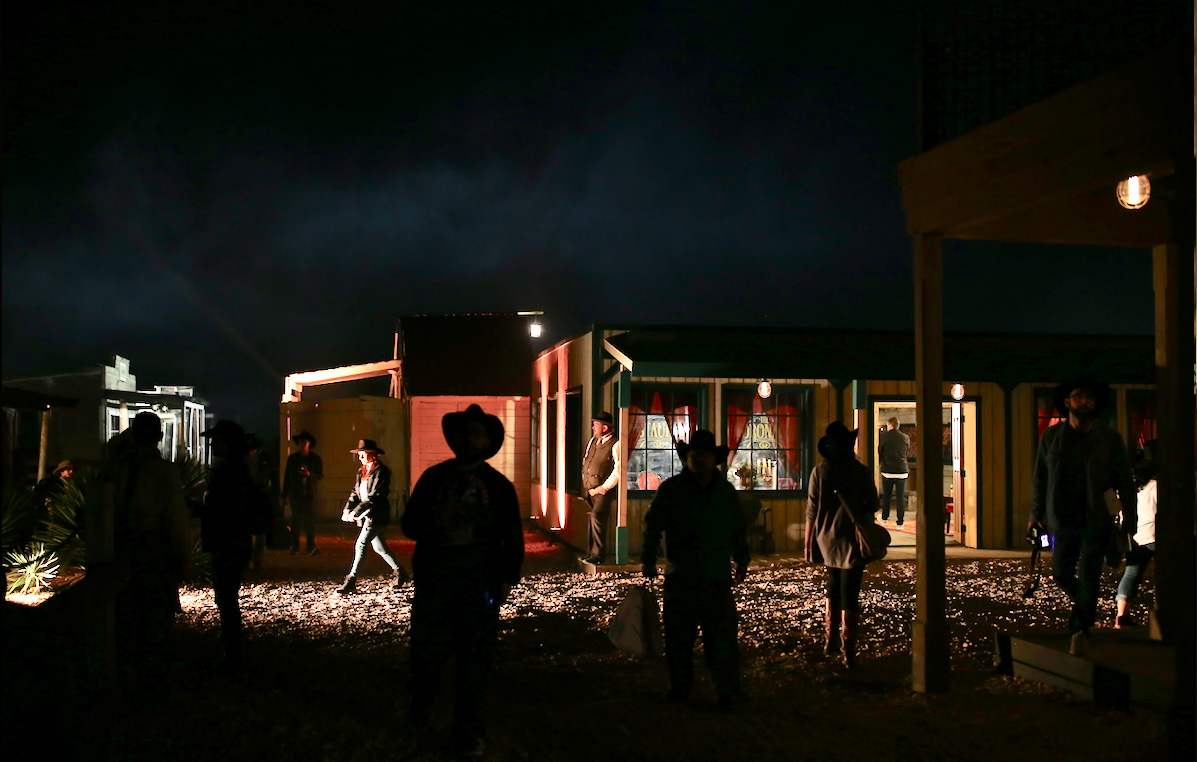
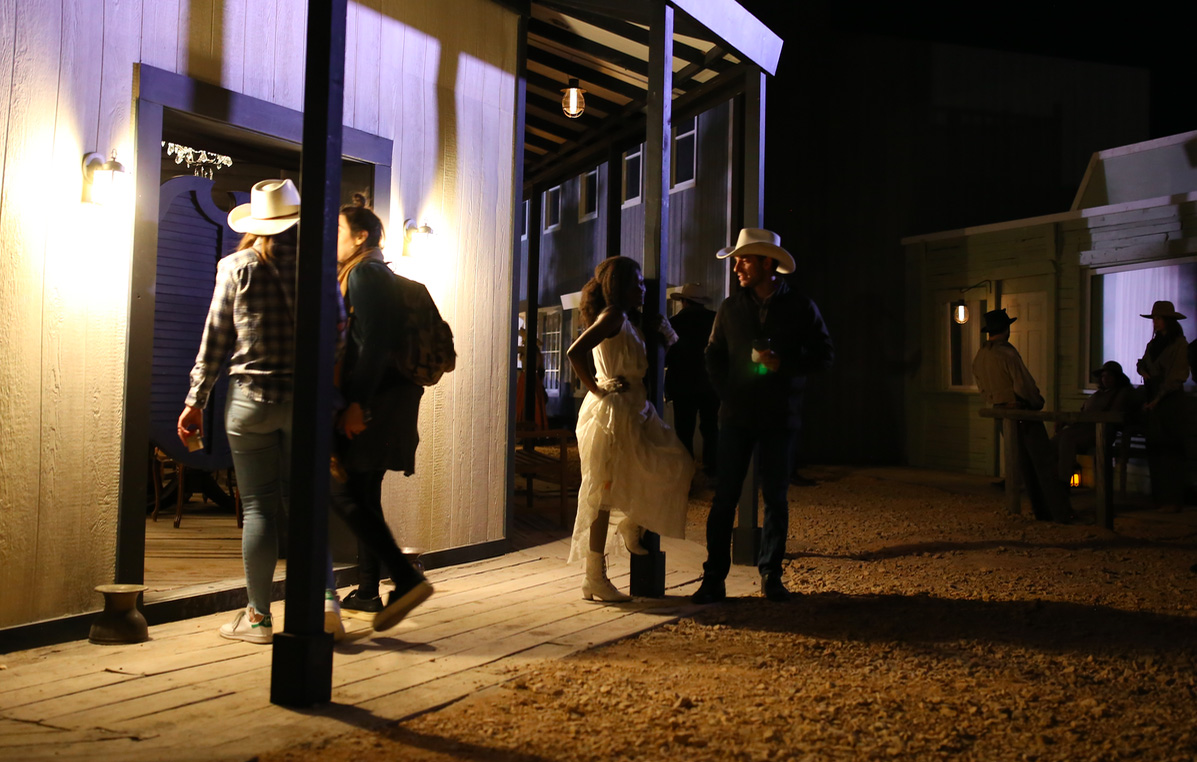
I need a drink, and so I walk—mosey?—over to the Mariposa Saloon, which is a real and immediate option upon entering Westworld. The saloon has those perfect swinging doors, and I swing my way through them upon entering. There’s a salty barkeep with a rag watching over it all; there’s a crew of grizzled barmen making pre-batched cocktails (Old Fashioned or Tequila something or other); there’s a poker game in the corner, half-occupied, with empty seats available; there are armed no-goodniks strutting about, looking for trouble; and there are, of course, true to all western depictions and particularly this Westworld universe, a costumed coterie of freelance independent contractors using the bar as a co-working space, engaged in the oldest profession.
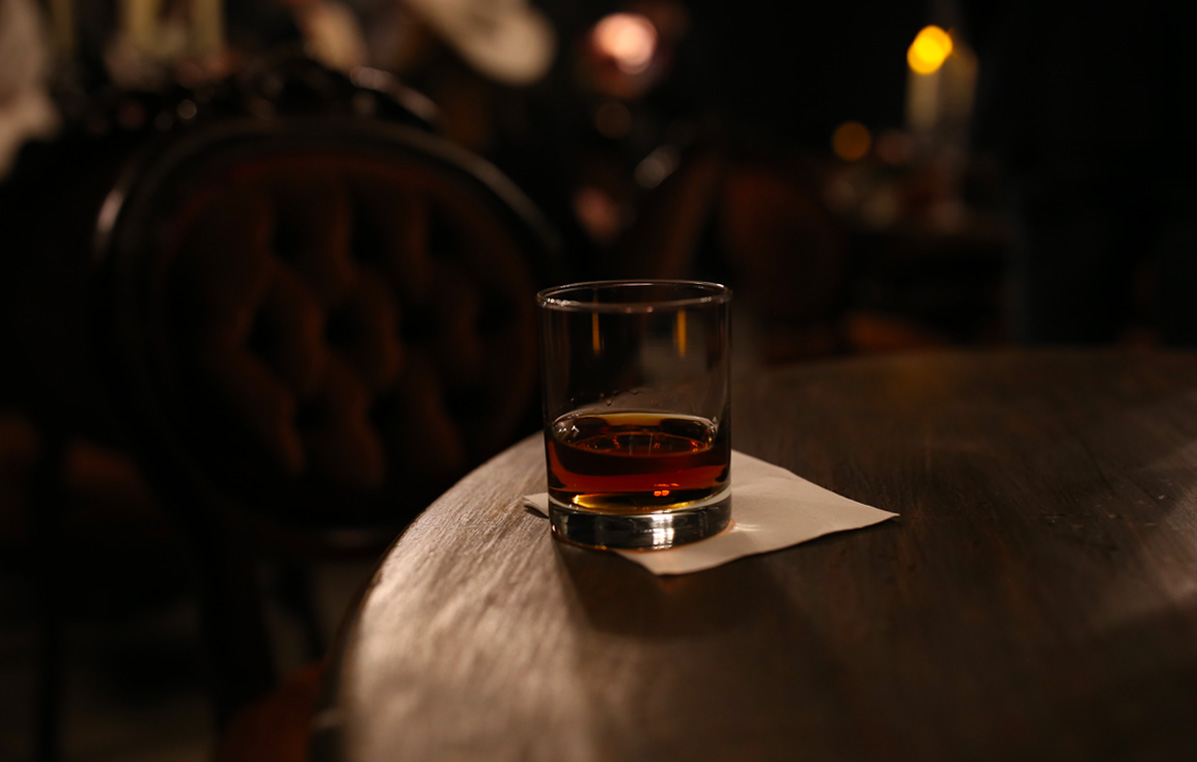
I order two fingers of bourbon, neat, and stake out a quiet corner of the room. There is, of course, a player piano—the second player piano of the evening—tinkling its way through a barroom interpretation of Radiohead’s “No Surprises.” This sort of vacation is actually my worst nightmare: the forced engagement with the cast, the expectation to play along, the preponderance of affect. A fight breaks out, but is quickly settled. The Wild West bartender mixing up cocktails looks exactly like Brandon Paul Weaver. The player piano’s spinning reel is caked in blood. A fella with a black hat and a pistol enters ominously, and the table of journalists next to me look up from their phones, connected to blocky mobile charging devices.
All this observation is starting to feel kind of besides the point. My whiskey’s dry, so I head back to country western Brandon Weaver for another pour of Elijah Craig—liquid courage to help me take a seat at that there blackjack table. They deal me in. “Black Hole Sun” comes on the player piano.
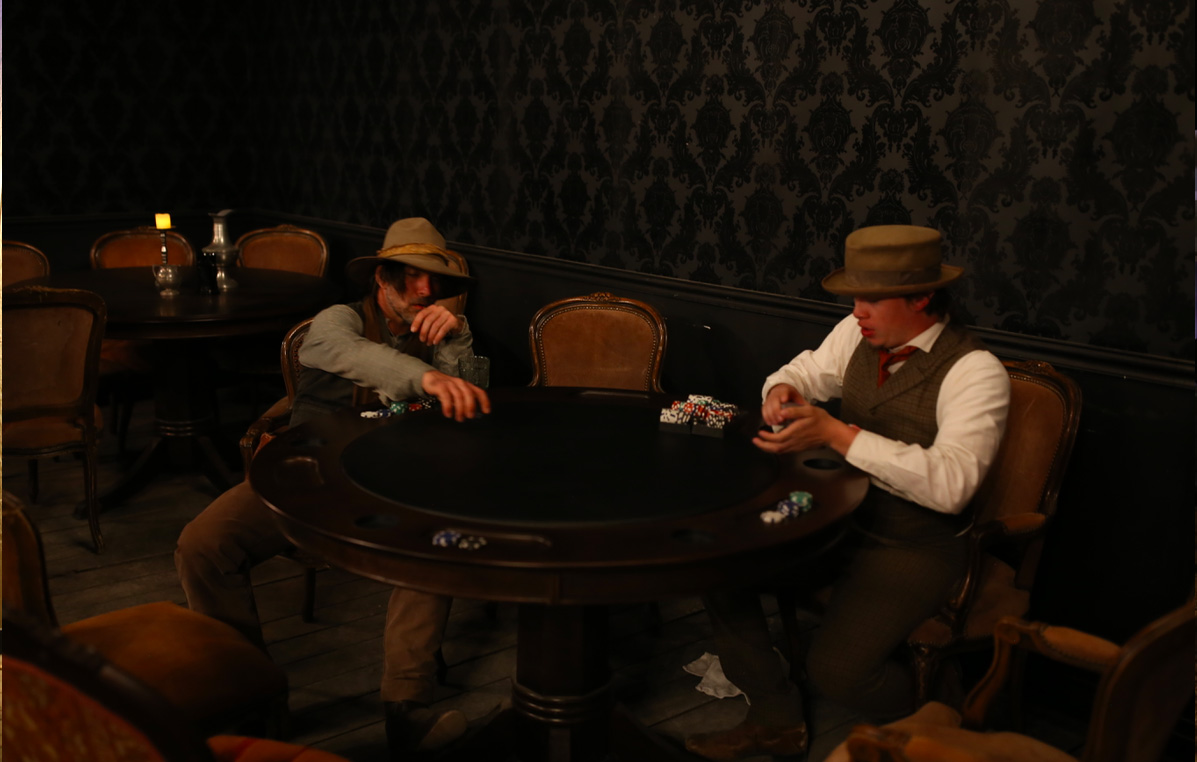
First hand, and the dealer’s showing 20. I bust. Second hand and he’s dealt himself 21. Three of the five people playing cards at this table are robots.
“You sure do have good luck tonight, Charlie.”
“Yup, I reckon even my train comes on time twice a day.”
Another hand gets dealt and wait—he’s holding back cards. Half that deck isn’t getting shuffled. These assholes are in cahoots. I bust on this hand immediately and Charlie gives me a sly, knowing wink. I find myself responding in character for the first time that evening.
“You know, Charlie,” I say, “a man could get killed for dealing cards like that around these parts.”
“How’d you think I got this job?”
The fella sitting next to Charlie graciously offers me a loan, and I decline, wary of this card game and everyone in it. He flips me a chip anyway, and it clatters to the ground. I lean over to pick it up and the rest of my chips are gone.
“Place your bet or get out.”
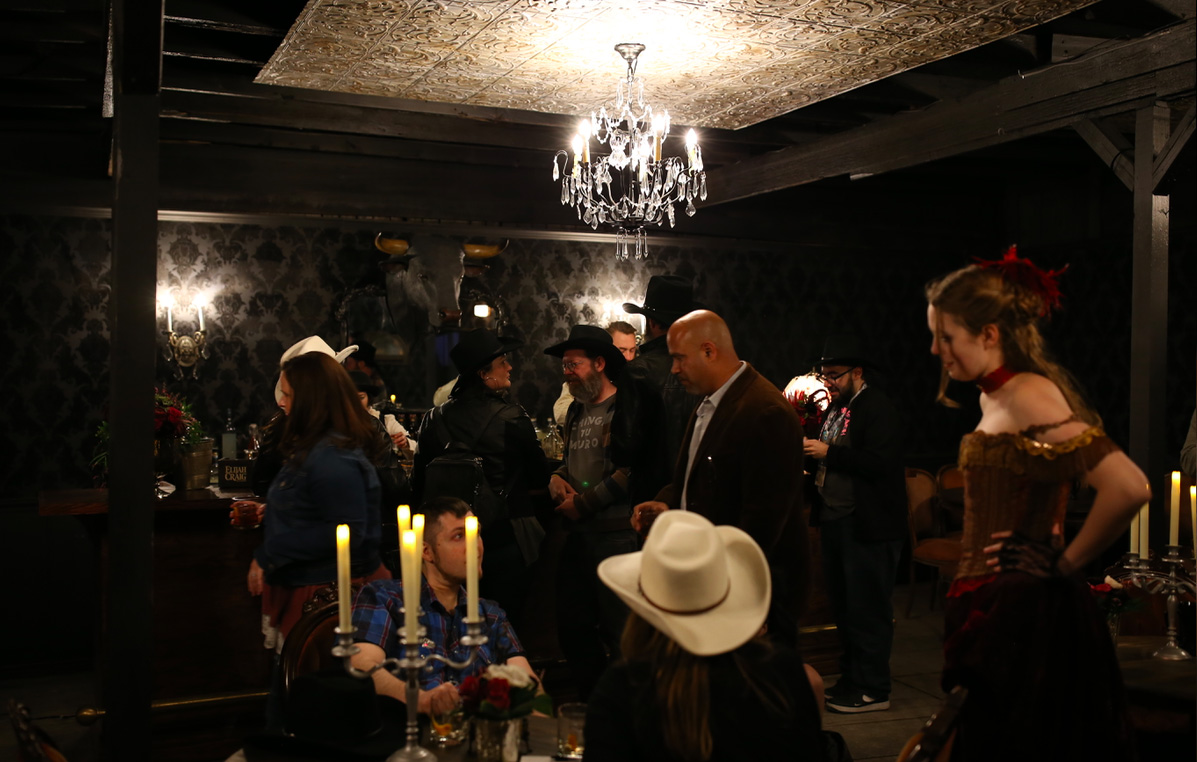
Two tables over there’s a freelancer staring a hole into the side of my cheek—or perhaps she’s the bar owner? What the hell do I know about wild west labor relations and equity distribution—and she’s fanning herself dramatically. A song by The Cure comes on the piano. I am utterly immersed, in spite of myself—an entourage effect of of play acting and simulacra and suspension of disbelief passing over into something real, or almost real, for just a second. It’s too good. I can’t help but smile. And then a lawman bursts into the bar, a big Yule Brenner looking hoss of a fella, hollering at the top of his lungs.
“There’s a bank robbery! Everyone to the square!”
The bar filters out dutifully towards the square, but I hang back to ask my favorite bar man one last question.
“Y’all got a hot cup of coffee here in Sweetwater?”
“No sir, at least not at this here saloon. I reckon you might check the Coronado Hotel? They’ve got a supper on special tonight.”
“Thank you kindly.”
***
In the square the threat of violence hangs like a heavy fog. There’s two men in custody already, held at gunpoint by the townsfolk, Derringers drawn, safeties unclicked. Gun violence is always part of the American conversation, but after the Parkland massacre I’d wondered how they might treat the spectre of guns in Sweetwater. They’re giving it center stage, it turns out, and though they didn’t arm us, the guests, they’ve got us tuned in and turned on for a public display of violence all the same. It is at the center of everything here in Sweetwater.
“I’m gonna kill that bastard!”
“Now sheriff, don’t be hasty!”
There’s real street justice happening before our very eyes, a cowpoke kangaroo court as I live and breath. The crowd is wild for it, frothing at the mouth.
“Shoot him!”
Was that an actor yelling that from the crowd, or a journalist?
“Kill the sumbitch!”
Surely that’s an actor? But then again I myself asked, in all seriousness, for “two fingers of bourbon” not five minutes ago, so perhaps I’m not the only one getting caught up in the spirit. These journalists are yelling for blood in the town square!
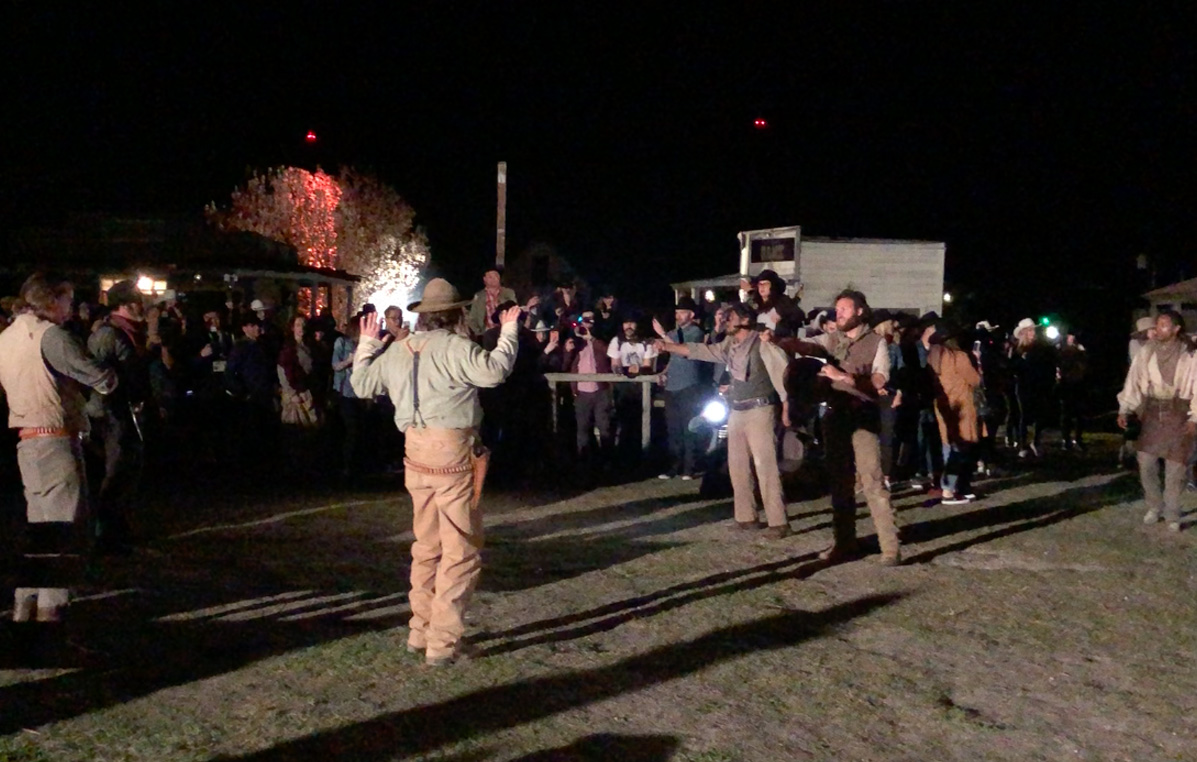
CRACK! A gun shot! The crowd screams!
“You shot Mr. Delacourt! Holy shit!”
The sheriff tries to shoot his gun in retaliation, but it won’t go off. He tries again, but his gun won’t fire. It’s the first nod that we’re in Westworld, and not Sweetwater. The spell is broken.
“FREEZE ALL MOTOR FUNCTION.”
A crew of Westworld park technicians, dressed in costume replica space suits from the show, charge into the town square. The crowd claps. I back slowly away from the square, towards the Coronado Hotel.
***
“What’s your surname, sir?”
“Michelman.”
“Are you Jordan, sir?”
“Like the river, ma’am.”
At the Coronado Hotel I’m checked in for supper by name, then served a literal can of beans, alongside foodie-approved Texas brisket and sliced sausage. I ask about coffee service at the hotel, but there is none, but there are real horses walking by outside—the source of that authentic smell—and there is a truly eerie and terrifying live band performing in the dance hall. They’re a three-piece performing what I can only describe as an interpretation of Westworld’s general sense of dread, creating a hypnotic and disturbing soundscape across two synthesizers and a set of softly tapped tom-toms. They are dressed in western wear and appear to be utterly in character. At the end of the song the band’s vocalist, who looks uncannily like a Ladies Of The Canyon-era Joni Mitchell, rings an enormous symbolic gong. It is the creepiest thing in Sweetwater and I must learn more.
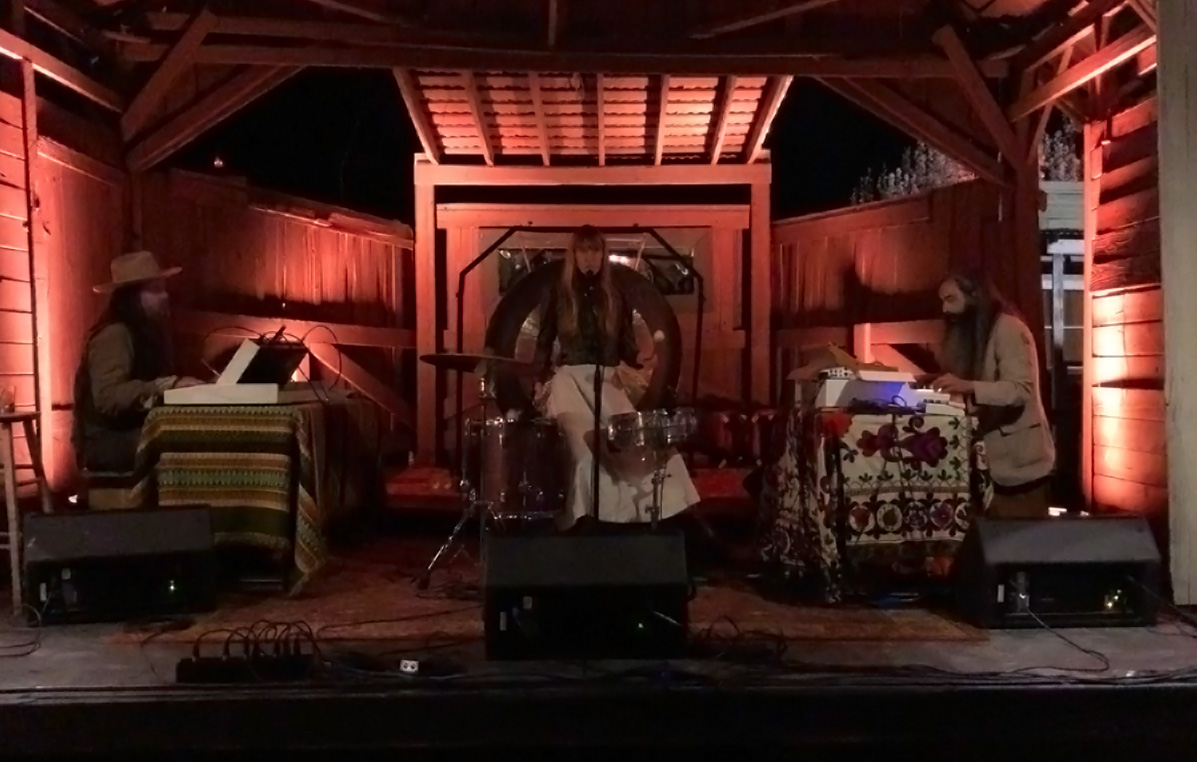
I start asking cast members about the band. Before long I’m introduced to the proprietor of the Coronado, an ornately dressed madame of a certain age by the name of Evangeline. Her husband has passed away, she tells me immediately, but she’s carried on as the proprietor of this here establishment, and she’s trying to keep the music modern to encourage a younger crowd. I’m promised an introduction to the band.
“May I take your arm?”
“Certainly, ma’am.”
“Thank you, Jordan. What line of business are you in?”
“I’m a newspaper man. Here from Portland, Oregon.”
“A newspaper man! From Or-ray-gone! Bless my stars, that’s a mighty long way to come! I hope your passage was a safe one?”
“Indeed it was, but I’m mighty tired now. Sure could use a pick-me-up. Tell me—do you serve coffee here at the Coronado?”
The shortest pause. The slightest glitch.
“Not tonight, sor—not tonight.”
I have tuned out the rest of the journalists, though I can see them passing through, in black hats mostly, filming themselves as they talk through their experiences at Westworld. Many are streaming live, willful human avatars of this experience. But I can’t hear them now. It’s just me and Evangeline, arm and arm, waiting for the band to finish. She trusts me, I understand now, because of my white hat. Otherwise we might have never shared this moment. And who could blame her? This is a lawless place.
The band is called Dallas Acid. They are very much a real band, with real touring dates following this gig in Sweetwater. Their aesthetic just happens to line up perfectly with that of Westworld. This is not schtick. The lead singer, who has a Swedish accent, tells me I can check them out on BandCamp.
***
I try and gamble again and lose more money to Charlie. It dawns on me that they’re ripping me off because I have a white hat, whereas players in a black hat are dealt winning hands as a show of fearful reverence. Nobody fears a white hat.
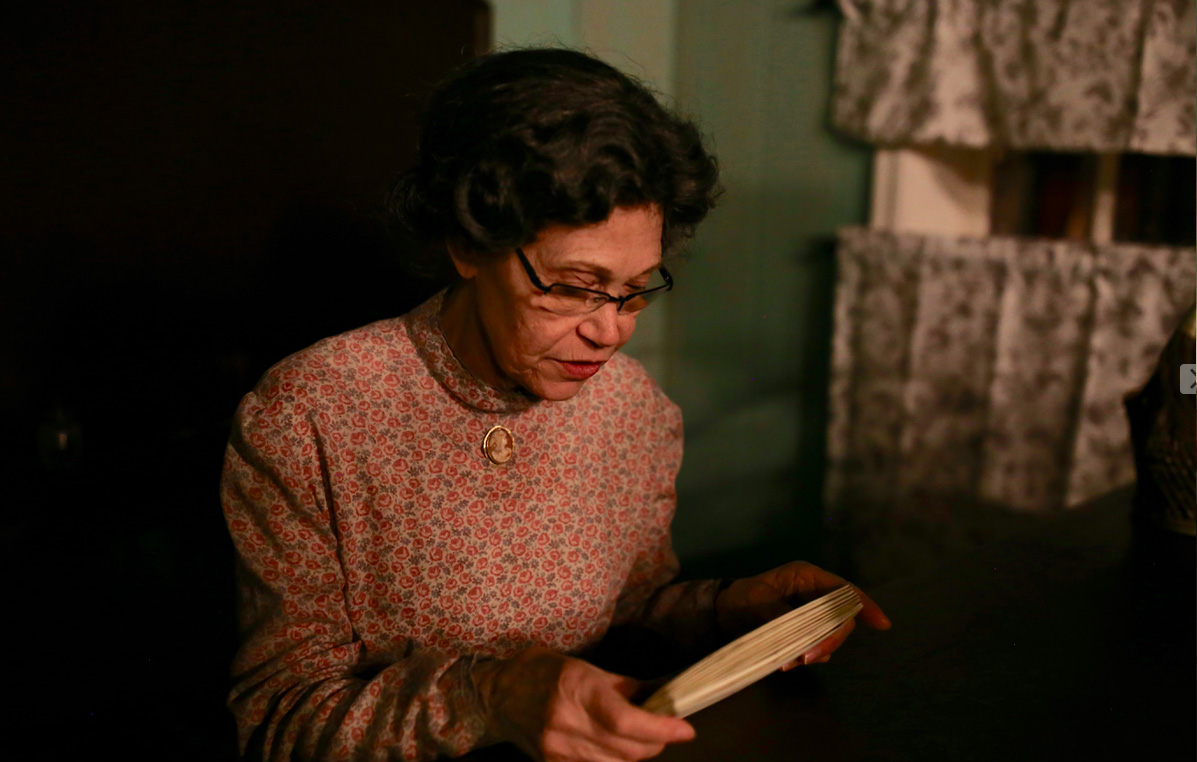
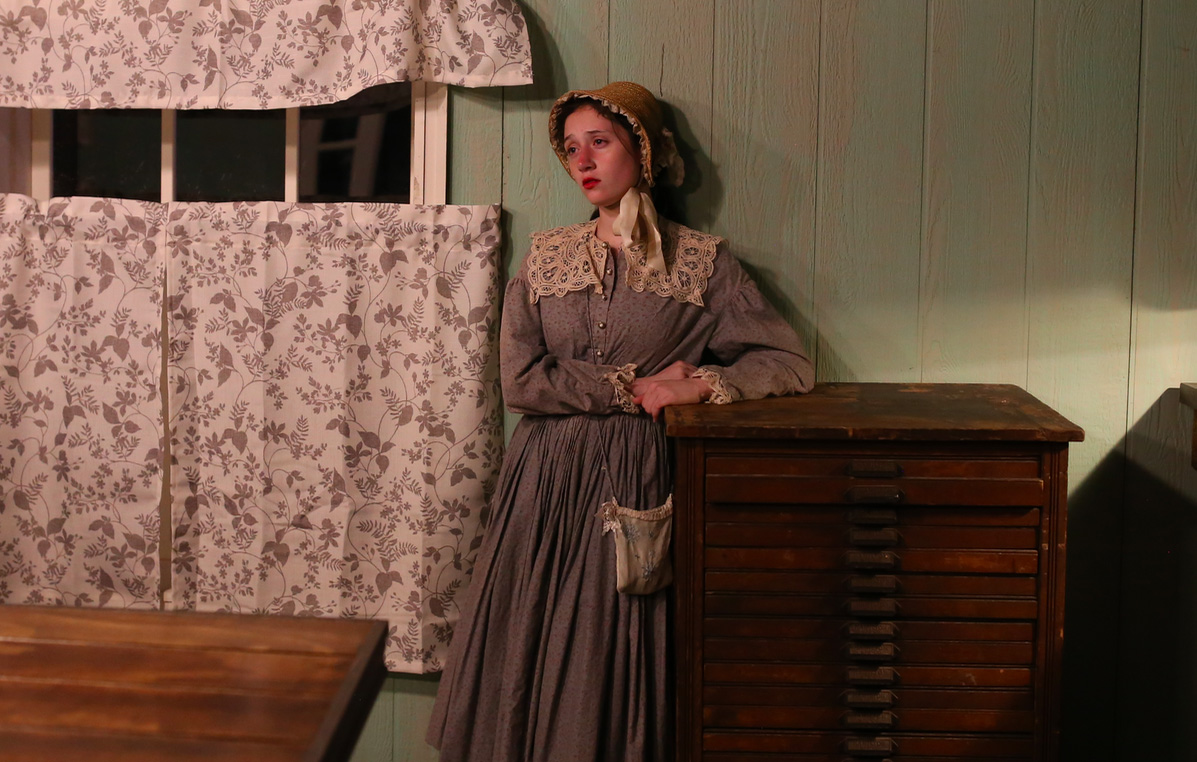
There’s mail with my name on it at the post office, and I send a postcard back home. I’m walking loops around the place now, watching as scripted tracks repeat themselves and the unreality of the places teters in and out of balance. At one point I overhear a private conversation between two of the actors, and it feels like the only real slip-up of the night.
“I can’t imagine having kids and doing this.”
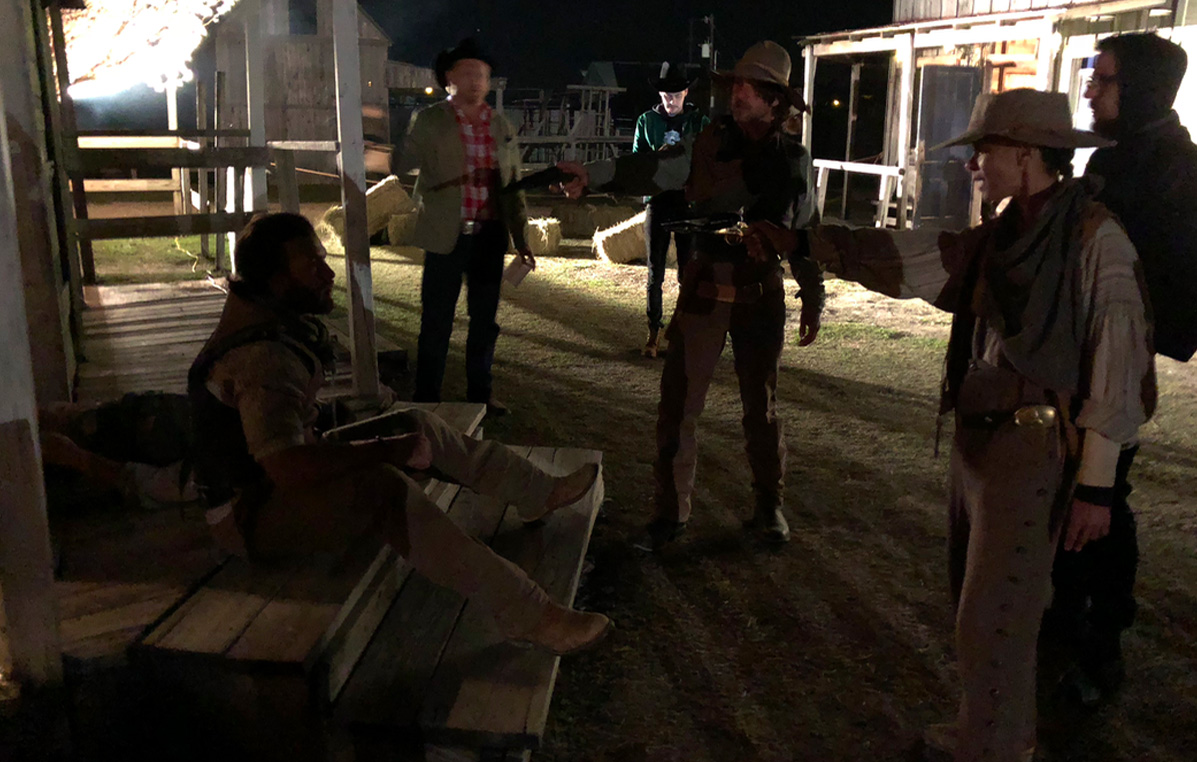
Another argument breaks out in the square. I excuse myself to the out house, which is utterly modern in line with ADA standards and Texas state law. The radio inside plays as song from Halsey. A journalist passes me on the way out, tips his black hat, and says “Howdy.”
I wander past the horseshoe toss to the checkout stand, and hear it again—CRACK!—the sound of gunfire in the distance. I’m getting used to it now. We check in to leave and then, in a wink to the plot points to come on Season 2 of Westworld, a man in full samurai warrior garb goes wandering past.
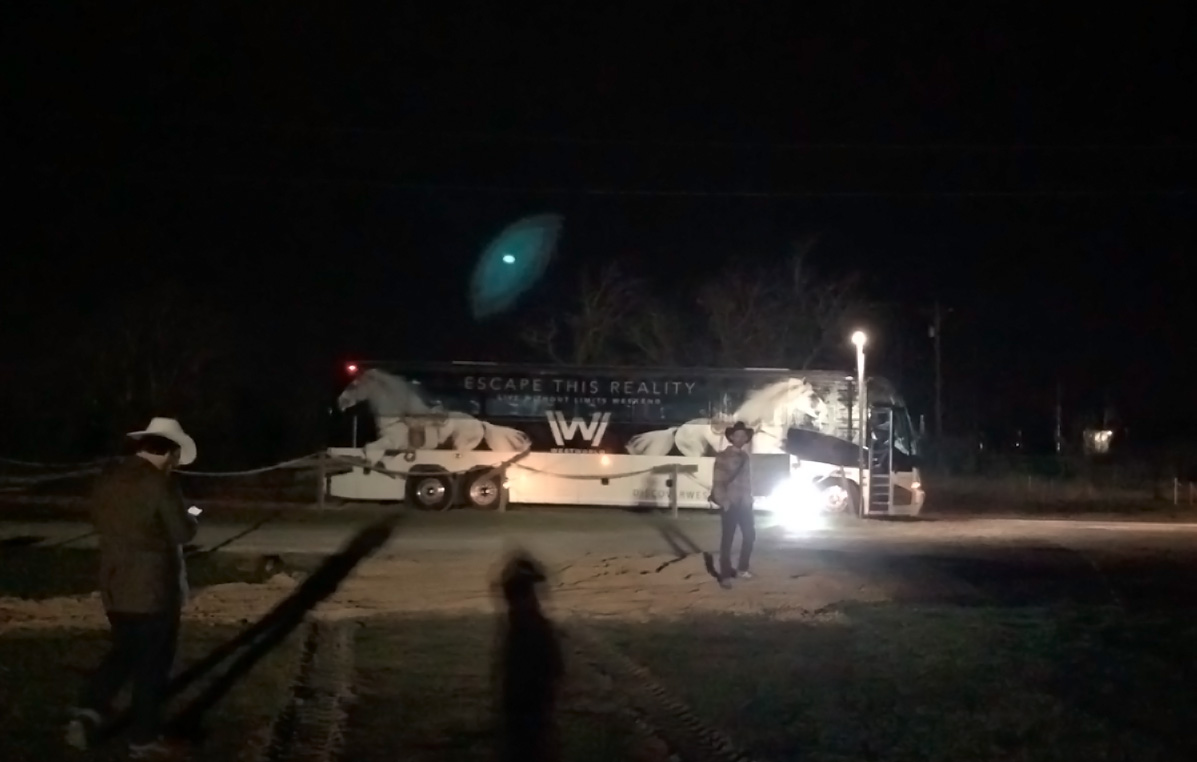
The bus looms in the distance, humming its low unhuman roar. Piano music is piped into the empty field before us. A horse whinnies in the distance. There is a massive black Toyota Tacoma truck with its emergency lights on in the parking lot, blinking out morse code. I walk towards the gleaming bus.
There is no coffee in Westworld.
Jordan Michelman is a co-founder and editor at Sprudge Media Network. Read more Jordan Michelman on Sprudge.




